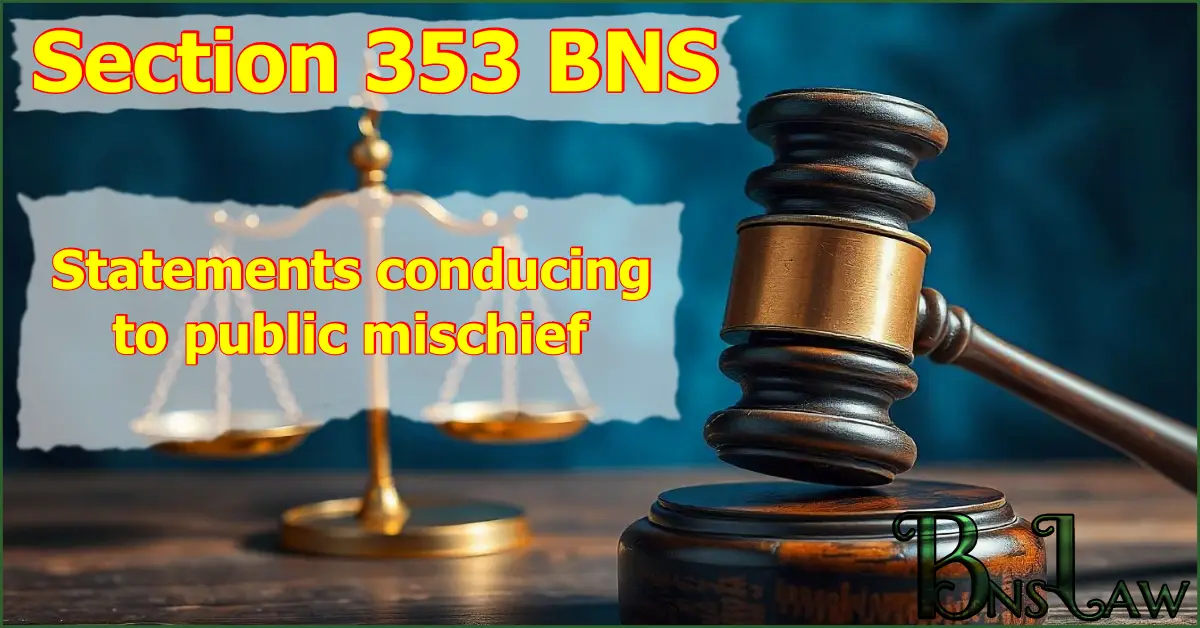Section 353 BNS | BNS 353
353(1) BNS
Whoever makes, publishes or circulates any statement, false information, rumour, or report, including through electronic means—
(a) with intent to cause, or which is likely to cause, any officer, soldier, sailor or airman in the Army, Navy or Air Force of India to mutiny or otherwise disregard or fail in his duty as such; or
(b) with intent to cause, or which is likely to cause, fear or alarm to the public, or to any section of the public whereby any person may be induced to commit an offence against the State or against the public tranquillity; or
(c) with intent to incite, or which is likely to incite, any class or community of persons to commit any offence against any other class or community, shall be punished with imprisonment which may extend to three years, or with fine, or with both.
353(2) BNS
Whoever makes, publishes or circulates any statement or report containing false information, rumour or alarming news, including through electronic means, with intent to create or promote, or which is likely to create or promote, on grounds of religion, race, place of birth, residence, language, caste or community or any other ground whatsoever, feelings of enmity, hatred or ill will between different religious, racial, language or regional groups or castes or communities, shall be punished with imprisonment which may extend to three years, or with fine, or with both.
353(3) BNS
Whoever commits an offence specified in sub-section (2) in any place of worship or in any assembly engaged in the performance of religious worship or religious ceremonies, shall be punished with imprisonment which may extend to five years and shall also be liable to fine.
Exception— It does not amount to an offence, within the meaning of this section, when the person making, publishing or circulating any such statement, false information, rumour or report, has reasonable grounds for believing that such statement, false information, rumour or report is true and makes, publishes or circulates it in good faith and without any such intent as aforesaid.
READ OTHER SECTIONS OF CHAPTER XIX — OF CRIMINAL INTIMIDATION, INSULT, ANNOYANCE, DEFAMATION, ETC.
| Section No. | Section Title |
|---|---|
| 351 | Criminal intimidation. |
| 352 | Intentional insult with intent to provoke breach of peace. |
| 353 | Statements conducing to public mischief. |
| 354 | Act caused by inducing person to believe that he will be rendered an object of Divine displeasure. |
| 355 | Misconduct in public by a drunken person. |
| Of Defamation | |
| 356 | Defamation. |
| Of Breach Of Contract To Attend On And Supply Wants Of Helpless Person | |
| 357 | Breach of contract to attend on and supply wants of helpless person. |
FAQs of BNS Section 353
-
353 BNS punishment and fine
Punishment and fine under Section 353 of the BNS—
353(1): Imprisonment for 3 years, or fine, or both.
353(2): Imprisonment for 3 years, or fine, or both.
353(3): Imprisonment for 5 years and fine. -
353 BNS cognizable or not
The offence under Section 353(1) of the BNS is non-cognizable and the offence under Section 353(2) and 353(3) is cognizable.
-
353 BNS bailable or not
The offence under Section 353(1), 353(2) and 353(3) of the BNS is non-bailable.
-
353 BNS trial court
Offence specified in Section 353(1), 353(2) and 353(3) of the BNS is triable by any Magistrate.
Important Points
- Cognizable Offences: These are offences where a police officer can arrest a person without a warrant.
- Non-Cognizable Offences: These are offences where a police officer cannot arrest a person without a warrant.
- Bailable Offences: These are offences where the accused can get bail from the police station itself. All bailable offences are listed in the First Schedule of the Bharatiya Nagarik Suraksha Sanhita (BNSS).
- Non-Bailable Offences: Offences in which bail is not granted directly from the police station but after hearing the case in the court, the judge decides when bail will be granted. All non-bailable offences are listed in the first schedule of the Bharatiya Nagarik Suraksha Sanhita (BNSS).
- In the above FAQ, “trial court” means the court that has jurisdiction to try the offence.
- In the above FAQ, the expression “Magistrate of the first class” and “Any Magistrate” does not include Executive Magistrates.
Read other Sections of the BNS
Reference Link: New Criminal Laws (BNS), Ministry of Home Affairs







